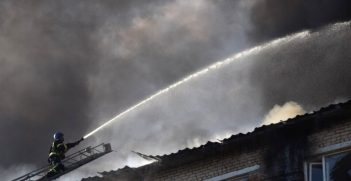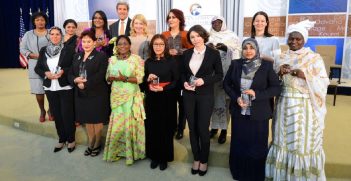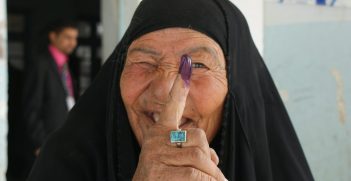Women and War: The Politics of Theatrical Representation

Iraqis are intimately familiar with war as a facet of everyday life, whereas Australians lack a tangible understanding of atrocity. Examining how war stories are presented on stage in both countries provides crucial insights on the similarities and differences of these disparate experiences.
My PhD thesis developed out of my personal interest to understand how the theatremakers in Western-allied countries that had signed onto George W. Bush’s “Coalition of the Willing” could or should respond culturally to remote wars. As an Iraqi person who witnessed successive wars and upheavals, I saw Australian troops on Iraqi land from 2003 to 2013 and wondered, what do these soldiers know about Iraqi people? Where do the two nations, Australia, and Iraq, meet? And where do they depart in their notions of gender, war, and art? With confusion, disillusionment, and disappointment that framed my personal experience during these years, I wanted to delve into a literary comparison of nations that watch war as remote spectators, and those who live war as a perpetuate experience.
Like many Iraqi scholars, I sought alternative outlets rather than mainstream news to articulate the collective atrocities. I also built on the work of scholars from the coalition of countries who tried to understand how deeply they were implicated in the violence, brutality, and injustice of the Iraq invasion in 2003. To depolarise the bulletins of governments, military, and the media, I found that theatrical rejoinders have the potential to portray alternative interpretations of the Iraq War. I chose to compare selected Australian and Iraqi plays about war, focusing mainly on women’s war experiences rather than those of the male soldiers. I compare the war concepts and practices, gender norms during wartimes, and schools of theatre and drama of two countries that are geographically distant, and culturally and politically apart.
It was inevitable to avoid the analysis of the political and social contexts when studying the cultural one. Hence, historicising Iraqi theatre in accordance with the war timeline facilitated tracking the changes occurred in the gender-war relations. For decades, Iraq has been a war zone: Iraq–Iran War (1980–1988), the Kuwait invasion and Gulf War (1990-1991), the Iraqi Uprising (1991), the economic embargo between (1990-2003), the US and Coalition invasion (2003), the sectarian violence (2006-2008), and most recently, the war against Daesh (2014-2017). The exhaustive damage of these wars surpasses the concept of harm that targets the physicality of humans and urban historical spaces. The continuity of instability has systematically refashioned the Iraqi collective identity and restructured gender norms to a hierarchical and exclusionary war narrative.
Generally, war legacies marginalise women’s presence by perpetuating a value system that prioritises male agency of war stories. Staging Iraqi women-centered perspectives about war de-hierarchieses that agency of war narration. Theatrical presentation of Iraqi women’s war experience delves into women’s perspectives that are either appropriated by dictatorship, decentralised by neocolonial dehumanisation, or overshadowed by national chaos. Theatre about war that shifts attention to the silenced war narrative updates its structure and technique. Under decades of dictatorship and censorship, or during decimation wrought by war, Iraqi theatre makers find in the process of creating theatre about women an artistic-dissident practice, leaving the door open for experimental theatre to dominate the stage. Deviating from the mainstream involves creating a shared space for the theatremaker and the spectator to acknowledge the collective atrocity.
This collectiveness is lacking in societies that participate in offshore wars and conflicts, such as Australia. Aside from bombardment by the Imperial Japanese Air Force during World War II, Australians have not experienced the physical damage of war. The narrative of Australian troops involved in remote wars is reported from a temporal or spatial remoteness. Conventionally, the dramatisation of the Australian war narrative involves personal narration of past wars, such as the two World Wars and the Vietnam War, or of contemporary wars, such as in Afghanistan and Iraq, that are geographically remote and culturally different from the Australian concept of war.
In such a case, war atrocities are not collective. Australian theatregoers are spectators of individualistic traumatic recounts that are narrated by soldiers, or of testimonial and calamitous narrative of the distant “other.” The latter problematises the war drive, specifically when it stages the real-life spectacles of remote people, culture, and suffering. Under this perspective, Australians, like other contemporary Western societies, approach war conceptually and practically from a distance, through isolated and personalised experiences.
The geographical distance individualises war narration and eclipses the agency of war stories to men and women who are personally involved in these conflicts. However, theatricalisation of women’s war experiences digs deeper into the Australian national war memory that is historically constructed around the figure of a white male combatant. The Gallipoli battle that announced the birth of a young, yet valorous nation established the myth of a masculine Australia. Though remotely practiced, wars and conflicts cemented a mainstream war narrative that romanticised the Gallipoli figure and silenced women and non-white subjects. More dangerously, it marginalises non-Gallipoli soldiers who participated in modern wars, particularly Afghanistan and Iraq. This is clearly evident in the considerable corpus of Australian drama about Gallipoli, as compared to that about the “War on Terror.”
Centralising Australian women in drama about war is not only a deviation from the masculine mainstream, it challenges the cultural norm that de-escalates their stories and isolates them from the public discourse. Theatre that presents women-centred war plays invites spectators to acknowledge consciously and engage effectively with Australian women, including soldiers, nurses, journalists, and prisoners of war. As theatre stretches the borderline of the war experience, it reinvents itself. Australian theater makers have created multimedia approaches to present women and war stories. Performance and media are utilised in a hybrid technique to validate and celebrate Australian women’s silenced war stories and to highlight the importance of popular culture in re-writing the national war saga.
Despite the clear chasm between the Iraqi and Australian experiences of war, centralising women’s recounts about war is a deviation from the war narrative no matter whether these societies are war zones or participants in distant conflicts. Wars, offshore or domestic, heavily link the national political agenda to the cultural production which, in turn, clichés gender roles during wartimes. Commemorating wars through cultural channels such as theatre embeds the gender-war culture and socially engraves war as a masculine story. While men who participate in war have the right to narrativise war stories and shape the national conception of war practice, women play the role of passive listeners. Confining the agency of war recounts to men mythologises the figure of the male soldier and negates or stereotypes women’s war involvement, resulting in popularising a distorted memory of the national history.
Unlike soldiers’ war stories, women’s war recounts are kaleidoscopic. They reflect their non-monolithic experiences during wartime. Women play the role of historical readers of the nation, as they embody the political and social propaganda of the state in times of wars.
Interestingly enough, as countries that have little sharable grounds, Australian and Iraqi women both share a secondary status in their national war sagas that, when theatre responds to their involvement in war, it freshens its techniques and approaches to women and war story.
The politics of epistemology, patriarchy, and neoliberal capitalism generate a value system that marginalises women-centred war narratives and normalises their secondary importance as irrelevant to the political dynamic. Women’s war narratives will be centralised only when their involvement in wars and conflicts are not bypassed politically, socially, or culturally.
Dr Hadeel Abdelhameed is an Honorary Academic Staff at the La Trobe University School of Humanities and Social Sciences. Her esearch interests include cultural representation of remote wars and inner conflicts, Iraqi women post 2003, Australian women in recent wars, gender codes in war-torn zones, and women’s rights.
This article is published under a Creative Commons Licence and may be republished with attribution.





